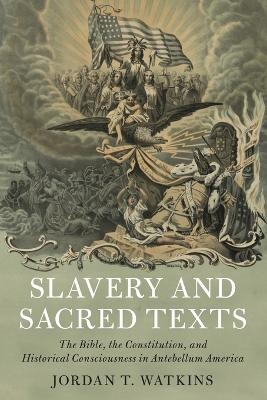
Slavery and Sacred Texts
The Bible, the Constitution, and Historical Consciousness in Antebellum America
Seiten
2023
Cambridge University Press (Verlag)
978-1-108-74689-2 (ISBN)
Cambridge University Press (Verlag)
978-1-108-74689-2 (ISBN)
Using the debate over American slavery as a case study, Jordan T. Watkins analyzes the development of historical consciousness in antebellum America, showing how Americans' appeal to the nations' sacred and religious texts - the Bible and the Constitution - gave rise to a growing sense of historical distance.
In the decades before the Civil War, Americans appealed to the nation's sacred religious and legal texts - the Bible and the Constitution - to address the slavery crisis. The ensuing political debates over slavery deepened interpreters' emphasis on historical readings of the sacred texts, and in turn, these readings began to highlight the unbridgeable historical distances that separated nineteenth-century Americans from biblical and founding pasts. While many Americans continued to adhere to a belief in the Bible's timeless teachings and the Constitution's enduring principles, some antislavery readers, including Theodore Parker, Frederick Douglass, and Abraham Lincoln, used historical distance to reinterpret and use the sacred texts as antislavery documents. By using the debate over American slavery as a case study, Jordan T. Watkins traces the development of American historical consciousness in antebellum America, showing how a growing emphasis on historical readings of the Bible and the Constitution gave rise to a sense of historical distance.
In the decades before the Civil War, Americans appealed to the nation's sacred religious and legal texts - the Bible and the Constitution - to address the slavery crisis. The ensuing political debates over slavery deepened interpreters' emphasis on historical readings of the sacred texts, and in turn, these readings began to highlight the unbridgeable historical distances that separated nineteenth-century Americans from biblical and founding pasts. While many Americans continued to adhere to a belief in the Bible's timeless teachings and the Constitution's enduring principles, some antislavery readers, including Theodore Parker, Frederick Douglass, and Abraham Lincoln, used historical distance to reinterpret and use the sacred texts as antislavery documents. By using the debate over American slavery as a case study, Jordan T. Watkins traces the development of American historical consciousness in antebellum America, showing how a growing emphasis on historical readings of the Bible and the Constitution gave rise to a sense of historical distance.
Jordan T. Watkins is an assistant professor of church history and doctrine at Brigham Young University. Previously, he was a coeditor at The Joseph Smith Papers Project.
Acknowledgements; Prologue; Introduction; 1. 'Recourse must be had to the history of those times'; 2. 'The ground will shake'; 3. 'Texts … designed for local and temporary use'; 4. 'The further we recede from the birth of the constitution'; 5. 'The culture of cotton has healed its deadly wound'; 6. 'Times now are not as they were'; 7. 'We have to do not … with the past, but the living present'; 8. A 'Modern crispus attucks'; Conclusion; Epilogue; Index.
| Erscheinungsdatum | 27.02.2023 |
|---|---|
| Reihe/Serie | Cambridge Historical Studies in American Law and Society |
| Zusatzinfo | Worked examples or Exercises |
| Verlagsort | Cambridge |
| Sprache | englisch |
| Maße | 152 x 229 mm |
| Gewicht | 646 g |
| Themenwelt | Geisteswissenschaften ► Geschichte ► Regional- / Ländergeschichte |
| Geschichte ► Teilgebiete der Geschichte ► Militärgeschichte | |
| Geschichte ► Teilgebiete der Geschichte ► Religionsgeschichte | |
| Recht / Steuern ► Rechtsgeschichte | |
| ISBN-10 | 1-108-74689-6 / 1108746896 |
| ISBN-13 | 978-1-108-74689-2 / 9781108746892 |
| Zustand | Neuware |
| Informationen gemäß Produktsicherheitsverordnung (GPSR) | |
| Haben Sie eine Frage zum Produkt? |
Mehr entdecken
aus dem Bereich
aus dem Bereich
neueste Manipulationstechniken als Waffengattung der NATO
Buch | Softcover (2023)
Westend (Verlag)
CHF 33,55
Deutschlands Schwäche in der Zeitenwende
Buch | Softcover (2023)
C.H.Beck (Verlag)
CHF 25,20


